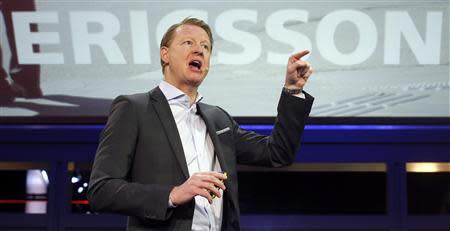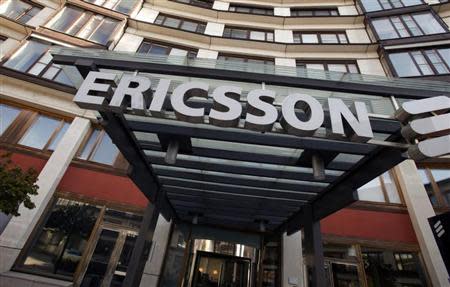Ericsson misses forecasts as waits for 4G boost
By Sven Nordenstam and Olof Swahnberg STOCKHOLM (Reuters) - Ericsson, the world's biggest mobile telecom equipment maker, missed first-quarter sales and profit forecasts as its work to rollout faster fourth-generation networks failed to offset the ending of older projects. The Swedish company said on Wednesday it expected sales to pick up as it benefits from recent contract wins, such as a five-year deal it signed with Vodafone in February. But its shares fell almost 5 percent, with some analysts noting the intense price competition in the mobile telecom equipment market where Ericsson competes with Chinese companies such as Huawei and ZTE, as well as European rivals Alcatel-Lucent and Nokia. "I am generally a bit pessimistic towards Ericsson," said Inge Heydorn, a fund manager at Sentat Asset Management who does not own Ericsson shares. "I don't think sales will come back. I think it's a tough market." Ericsson said it made earnings before interest and tax of 2.6 billion Swedish crowns (235 million pounds) in the first quarter, up from 2.1 billion in the same period last year, but well short of analysts' mean forecast of 3.5 billion. Revenue fell by 7 percent adjusted for currency swings, with growth in China, the Middle East and Latin America failing to offset previously flagged declines in North America and Japan due to the ending of projects with major clients. Ericsson has long been expected to benefit from big investments by telecoms firms in high-speed fourth-generation (4G) networks to cope with a surge in mobile data traffic as consumers increasingly look to access videos on the move. The company has supplied a majority of so-called Long-Term Evolution (LTE) networks already in use and has the strongest portfolio of patents for the technology in the industry. It said on Wednesday it expected sales from such projects to pick up in the second half of this year. EXECUTION MODE In February, Ericsson signed a deal to provide Vodafone with network equipment and services as part of the British firm's 7-billion-pound investment plan, Project Spring. It also expects to benefit from the massive rollout of 4G networks by the three telecom operators in China. "We are in execution mode on 4G in China right now," Chief Executive Hans Vestberg said on a conference call. However, some analysts are concerned about the competition Ericsson faces, particularly on price. Huawei said in March it aimed to almost double last year's record revenue by 2018, while Alcatel is battling to turnaround years of losses and Nokia has pledged to compete aggressively for contracts. "Ericsson is the leader in an industry that is growing in users and data traffic but not in revenues," said Bengt Nordstrom, chief executive at telecom consultancy Northstream. On a brighter note, Ericsson's underlying profitability continued to improve in the first quarter. Its closely watched gross profit margin rose to 36.5 percent compared with expectations of 34.0 percent and 32.0 percent in the year-ago quarter, boosted by mobile broadband capacity projects and more software sales to some clients. "The gross margin is offsetting somewhat the sales disappointment," Exane BNP Paribas analyst Alexandre Peterc said. At 1125 GMT, Ericsson's shares were down 4.7 percent at 82.2 crowns, the second-biggest drop by a European blue-chip stock. At Tuesday's close, the stock had risen 10 percent this year compared with a 3 percent drop in the STOXX Europe 600 Technology index. Shares in Nokia and Alcatel, due to post results on April 29 and May 9 respectively, had fallen 6.5 and 13 percent this year. (Additional reporting by Simon Johnson; Editing by Mark Potter)

 Yahoo News
Yahoo News 

